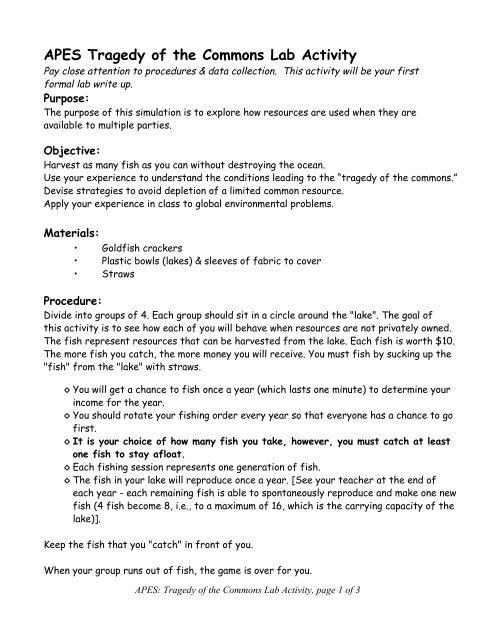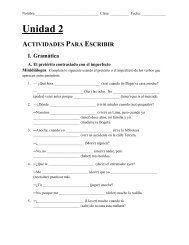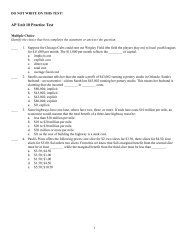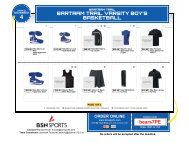APES Tragedy of the Commons Lab Activity
APES Tragedy of the Commons Lab Activity
APES Tragedy of the Commons Lab Activity
Create successful ePaper yourself
Turn your PDF publications into a flip-book with our unique Google optimized e-Paper software.
<strong>APES</strong> <strong>Tragedy</strong> <strong>of</strong> <strong>the</strong> <strong>Commons</strong> <strong>Lab</strong> <strong>Activity</strong><br />
Pay close attention to procedures & data collection. This activity will be your first<br />
formal lab write up.<br />
Purpose:<br />
The purpose <strong>of</strong> this simulation is to explore how resources are used when <strong>the</strong>y are<br />
available to multiple parties.<br />
Objective:<br />
Harvest as many fish as you can without destroying <strong>the</strong> ocean.<br />
Use your experience to understand <strong>the</strong> conditions leading to <strong>the</strong> “tragedy <strong>of</strong> <strong>the</strong> commons.”<br />
Devise strategies to avoid depletion <strong>of</strong> a limited common resource.<br />
Apply your experience in class to global environmental problems.<br />
Materials:<br />
• Goldfish crackers<br />
• Plastic bowls (lakes) & sleeves <strong>of</strong> fabric to cover<br />
• Straws<br />
Procedure:<br />
Divide into groups <strong>of</strong> 4. Each group should sit in a circle around <strong>the</strong> "lake". The goal <strong>of</strong><br />
this activity is to see how each <strong>of</strong> you will behave when resources are not privately owned.<br />
The fish represent resources that can be harvested from <strong>the</strong> lake. Each fish is worth $10.<br />
The more fish you catch, <strong>the</strong> more money you will receive. You must fish by sucking up <strong>the</strong><br />
"fish" from <strong>the</strong> "lake" with straws.<br />
You will get a chance to fish once a year (which lasts one minute) to determine your<br />
income for <strong>the</strong> year.<br />
You should rotate your fishing order every year so that everyone has a chance to go<br />
first.<br />
It is your choice <strong>of</strong> how many fish you take, however, you must catch at least<br />
one fish to stay afloat.<br />
Each fishing session represents one generation <strong>of</strong> fish.<br />
The fish in your lake will reproduce once a year. [See your teacher at <strong>the</strong> end <strong>of</strong><br />
each year - each remaining fish is able to spontaneously reproduce and make one new<br />
fish (4 fish become 8, i.e., to a maximum <strong>of</strong> 16, which is <strong>the</strong> carrying capacity <strong>of</strong> <strong>the</strong><br />
lake)].<br />
Keep <strong>the</strong> fish that you "catch" in front <strong>of</strong> you.<br />
When your group runs out <strong>of</strong> fish, <strong>the</strong> game is over for you.<br />
<strong>APES</strong>: <strong>Tragedy</strong> <strong>of</strong> <strong>the</strong> <strong>Commons</strong> <strong>Lab</strong> <strong>Activity</strong>, page 1 <strong>of</strong> 3
A bonus will be given to <strong>the</strong> student in each group who has accumulated <strong>the</strong> most wealth at<br />
<strong>the</strong> end <strong>of</strong> <strong>the</strong> entire simulation.<br />
Fish Data Table: Round 1 Blind fishing. No talking allowed!<br />
Year #<br />
1<br />
2<br />
3<br />
Total<br />
Group Totals:<br />
Name<br />
Total Fish Harvest<br />
Total Income<br />
# <strong>of</strong> Fish<br />
at beginning<br />
<strong>of</strong> year<br />
XXXX<br />
# <strong>of</strong> fish<br />
taken by 1st<br />
fisher<br />
# <strong>of</strong> fish<br />
taken by 1st<br />
fisher<br />
# <strong>of</strong> fish<br />
taken by 1st<br />
fisher<br />
# <strong>of</strong> fish<br />
taken by 1st<br />
fisher<br />
Total fish<br />
left at end<br />
<strong>of</strong> year<br />
XXXX<br />
.<br />
Fish Data Table: Round 2 Open fishing. Free exchange <strong>of</strong> information encouraged!<br />
Year #<br />
1<br />
2<br />
3<br />
Total<br />
Group Totals:<br />
Name<br />
Total Fish Harvest<br />
Total Income<br />
# <strong>of</strong> Fish<br />
at beginning<br />
<strong>of</strong> year<br />
XXXX<br />
# <strong>of</strong> fish<br />
taken by 1st<br />
fisher<br />
# <strong>of</strong> fish<br />
taken by 1st<br />
fisher<br />
# <strong>of</strong> fish<br />
taken by 1st<br />
fisher<br />
<strong>APES</strong>: <strong>Tragedy</strong> <strong>of</strong> <strong>the</strong> <strong>Commons</strong> <strong>Lab</strong> <strong>Activity</strong>, page 2 <strong>of</strong> 3<br />
# <strong>of</strong> fish<br />
taken by 1st<br />
fisher<br />
Total fish<br />
left at end<br />
<strong>of</strong> year<br />
XXXX
Analysis & Discussion Questions:<br />
1. Did anyone in your group take too many fish? How did that make you feel? Did everyone<br />
try to take as many as possible? Why or Why not? Does society reward those with <strong>the</strong><br />
"most"?<br />
2. Did anyone sacrifice <strong>the</strong> # <strong>of</strong> fish, for <strong>the</strong> good <strong>of</strong> <strong>the</strong> community? Why or why not?<br />
Does society ever reward that type <strong>of</strong> person?<br />
3. During round 2, did your group discuss your actions and strategies before each harvest?<br />
If so, briefly relate <strong>the</strong> discussion. Did each member carry out <strong>the</strong> plan that was<br />
discussed?<br />
4. In Game Two... how did your strategy change, if at all? Does it make a difference to<br />
know what <strong>the</strong> rewards are?<br />
5. Is it possible to maximize <strong>the</strong> number <strong>of</strong> fish caught/person AND <strong>the</strong> number <strong>of</strong> fish<br />
remaining in <strong>the</strong> pond at <strong>the</strong> same time? Why or Why not?<br />
6. Your fish harvest was worth money. Why would it be better to have money than fish (i.e.<br />
what can you do with money that you can't do with fish?)?<br />
7. Think <strong>of</strong> a local commons that you are familiar with. [parking lots, bathrooms,<br />
Cafeteria,, etc.] Do similar situations arise? Explain. HOW might those problems be<br />
solved?<br />
8. What are some natural resources that are common resources?<br />
9. What are <strong>the</strong> global commons? Are <strong>the</strong>se being used wisely? Why or why not?<br />
10. What can people do to use <strong>the</strong>se resources most wisely?<br />
Conclusion: What is <strong>the</strong> "<strong>Tragedy</strong> <strong>of</strong> <strong>the</strong> <strong>Commons</strong>"?<br />
The "tragedy <strong>of</strong> <strong>the</strong> commons" is <strong>the</strong> situation in which individuals use a common resource<br />
for <strong>the</strong>ir own personal gain and degradation <strong>of</strong> <strong>the</strong> common resources results, leading to a<br />
decrease in yield for both <strong>the</strong> group and <strong>the</strong> individual. The use <strong>of</strong> common resources is a<br />
tricky issue...who has rights to it? How are responsibilities shared?<br />
<strong>APES</strong>: <strong>Tragedy</strong> <strong>of</strong> <strong>the</strong> <strong>Commons</strong> <strong>Lab</strong> <strong>Activity</strong>, page 3 <strong>of</strong> 3






